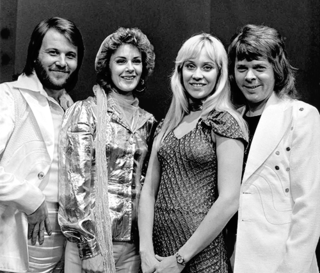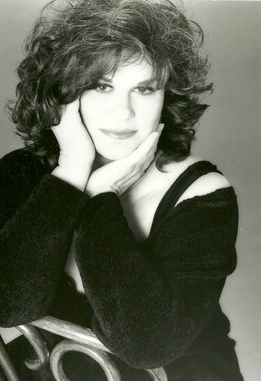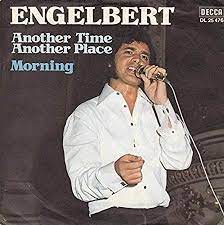Related Research Articles

The discography of Swedish pop music group ABBA consists of nine studio albums, two live albums, seven compilation albums, four box sets, five video albums, 50 singles, and 43 music videos. To date, ABBA has sold 150 million records worldwide becoming one of the best-selling music artists in history. They have scored 9 No. 1 singles and 10 No. 1 albums in the UK, becoming the most successful Swedish act of all time on the Official Charts.

Hugo Mario Montenegro was an American orchestra leader and composer of film soundtracks. His best-known work is interpretations of the music from Spaghetti Westerns, especially his cover version of Ennio Morricone's main theme from the 1966 film The Good, the Bad and the Ugly. He composed the score for the 1969 Western Charro!, which starred Elvis Presley.
"Tell Me Why" is a popular song written by Marty Gold with the lyrics by Al Alberts. The song was published in 1951.
The Canadian Singles Chart was a chart compiled by the American-based music sales tracking company, Nielsen SoundScan, which began publication in November 1996. It was published every Wednesday and also published on Thursday by Jam!/Canoe. It was superseded by the Billboard-published Canadian Hot 100 in 2007.
Leigh Ashford was a Canadian rock group formed in Toronto, Ontario, Canada, and which existed between 1966 and 1974.
Douglas Brian Riley, CM was a Canadian musician, also known as Dr. Music. He spent two decades with the Famous People Players as its musical director, besides his participation on over 300 album projects in various genres. Riley died of a heart attack on August 27, 2007.
Gwendolyn Dianne Brooks, was a soul, r&b and jazz singer from New Jersey. With the Three Playmates, Brooks recorded several songs in 1957. She moved to Toronto shortly thereafter. Her part in Canadian soul music history began when the group Diane Brooks, Eric Mercury and the Soul Searchers was formed. As a solo singer, she recorded two albums and several singles of her own. Her biggest solo hit was "Walkin' on My Mind" in 1969. She was also a prolific session singer. As a vocalist, she provided backing vocals on albums by a multitude of artists that include Anne Murray, Gino Vannelli and Richie Havens. She was also a song-writer.

Rush was a Canadian progressive rock band originally formed in August 1968, in the Willowdale neighbourhood of Toronto, Ontario. For the overwhelming majority of its existence, the band consisted of bassist, keyboardist, and lead vocalist Geddy Lee, guitarist Alex Lifeson, and drummer and lyricist Neil Peart. The band achieved this definitive form when Neil Peart replaced original drummer, John Rutsey, in July 1974.
Motherlode was a Canadian pop rock group formed in 1969 in London, Ontario. The group scored some success in the US with their single, "When I Die", which hit #1 in Canada and #18 on the U.S. Billboard Hot 100 chart in 1969. The group didn't have a bass guitarist. William Smith would play the bass notes on his keyboard. They did however use bass players on their studio recordings.
"Morningtown Ride" is a lullaby, written and performed by Malvina Reynolds. It was covered by The Seekers and their recording reached No. 2 on the UK Singles Chart. The song tells the comforting story of the journey through nighttime made by all the "little travellers" (children), on board a train, with the Sandman as guard.

The discography of American country artist Skeeter Davis contains 32 studio albums, 18 compilation albums, 59 singles, 53 lead singles, six collaborative singles, two other charted songs and two additional appearances. Davis was first one half of the duo, The Davis Sisters before embarking on a solo career with the RCA Victor label. Her second single was 1957's "Lost to a Geisha Girl", which reached the top 15 of the American Billboard Hot Country Songs chart. It was followed in 1959 by the top five country selection, "Set Him Free". The same year, Davis's debut studio album was issued on RCA Victor titled I'll Sing You a Song and Harmonize Too. Her career momentum continued to build in 1960 with two top five back-to-back singles: "(I Can't Help You) I'm Falling Too" and "My Last Date ". Both selections also climbed into the Billboard Hot 100 top 40. They were featured on Davis's second studio album called Here's the Answer. Between 1961 and 1962, Davis had top ten Billboard country singles with "Optimistic" and "Where I Ought to Be".

The discography of American country music singer-songwriter K. T. Oslin contains six studio albums, six compilation albums, one video album, seven music videos, 25 singles and six album appearances. Oslin signed a recording contract with Elektra Records in 1981. Both singles failed to become major hits. She then signed with RCA Records in 1987 and released the single "80's Ladies." The song became a top ten country hit, reaching number seven on the Billboard Hot Country Songs chart in July 1987. Oslin's corresponding debut studio album of the same name reached number one on the Billboard Top Country Albums chart and spent 148 weeks on the list. It would also be her highest-charting album on the Billboard 200, peaking at number 68. The album would sell one million copies and spawn the number one hits "Do Ya" and "I'll Always Come Back." Oslin's second album, This Woman was released in 1988 and was her second record to certify platinum in sales. It was her second-highest charting album on the country chart, reaching number two in 1989. Its second single, "Hold Me," topped the country songs chart in January 1989. The album also spawned the top ten hits "Hey Bobby" and the title track.
"Peter Gunn" is the theme music composed by Henry Mancini for the television show of the same name. The song was the opening track on the original soundtrack album, The Music from Peter Gunn, released in 1959. Mancini won an Emmy Award and two Grammys for Album of the Year and Best Arrangement.

"Another Time, Another Place" is a song by Engelbert Humperdinck, the title track of his 1971 LP. It became an international hit, reaching No. 13 in the United Kingdom and No. 16 in Canada.
Revolution Records was a Canadian Record company. It was also the parent company for the Revolver label. It had success with hits from artists such as Dianne Brooks and Motherlode.
Christopher Kearney is a Canadian singer and songwriter who kicked off his career after military service. He had a hit in 1970 with "Theme for Jody". He had more chart success with the single "Loosen Up".
Young was a Canadian rock music group led by Roger Plomish.They released a few singles and an album during the 1970s. They had success with "Goin' to the Country" which was a hit in both Canada and the United States. Their album also spent about 14 weeks in the charts. The group may have been working on a second album prior to their break up.
Tapestry was an early 1970s Canadian musical group fronted by singers Jack Winters, Heather Woodburn and Judy Harmon aka Judi Jensen. They released several singles and had a hit with "The Music Doesn't Seem to Be Going Anywhere". Some of their other singles also charted.
Life was a late 1960s/early 1970s Canadian musical group who had success with the top 20 hit, "Hands of the Clock". They also charted with a cover of the Beatles’ "Strawberry Fields Forever".
"Hands of the Clock" was a hit for Canadian band Life in 1969. It was written and produced by Neil Sheppard.
References
- ↑ 45Cat - Leigh Ashford - Discography, Canada
- ↑ Cash Box, May 15, 1971 - Page 26 Leigh Ashford Inks RCA Pact
- ↑ citizenfreak.com (© Museum of Canadian Music) - Ashford, Leigh - Kinfolk
- ↑ 45Cat - Leigh Ashford - Discography, Canada
- ↑ Billboard, January 2, 1971 - International News Reports, Maple Leaf System Winner
- ↑ RPM Weekly, Volume 14 No 23 January 23, 1971 - Page 2 RCA makes big push for Leigh Ashford
- ↑ Billboard, January 30, 1971 - Page 53 International News, From The Music Capitals of the World TORONTO
- ↑ RPM Weekly, Volume 14 No 23 January 23, 1971 - Page 2 RCA makes big push for Leigh Ashford
- ↑ RPM Weekly, Volume 14 No 23 January 23, 1971 - Page 9 RPM100 SINGLES
- ↑ Billboard, February 6, 1971 - Page 68 Canada's Content Rule For Radio in 1st Week
- ↑ "RPM Top 100 Singles - March 6, 1971" (PDF).